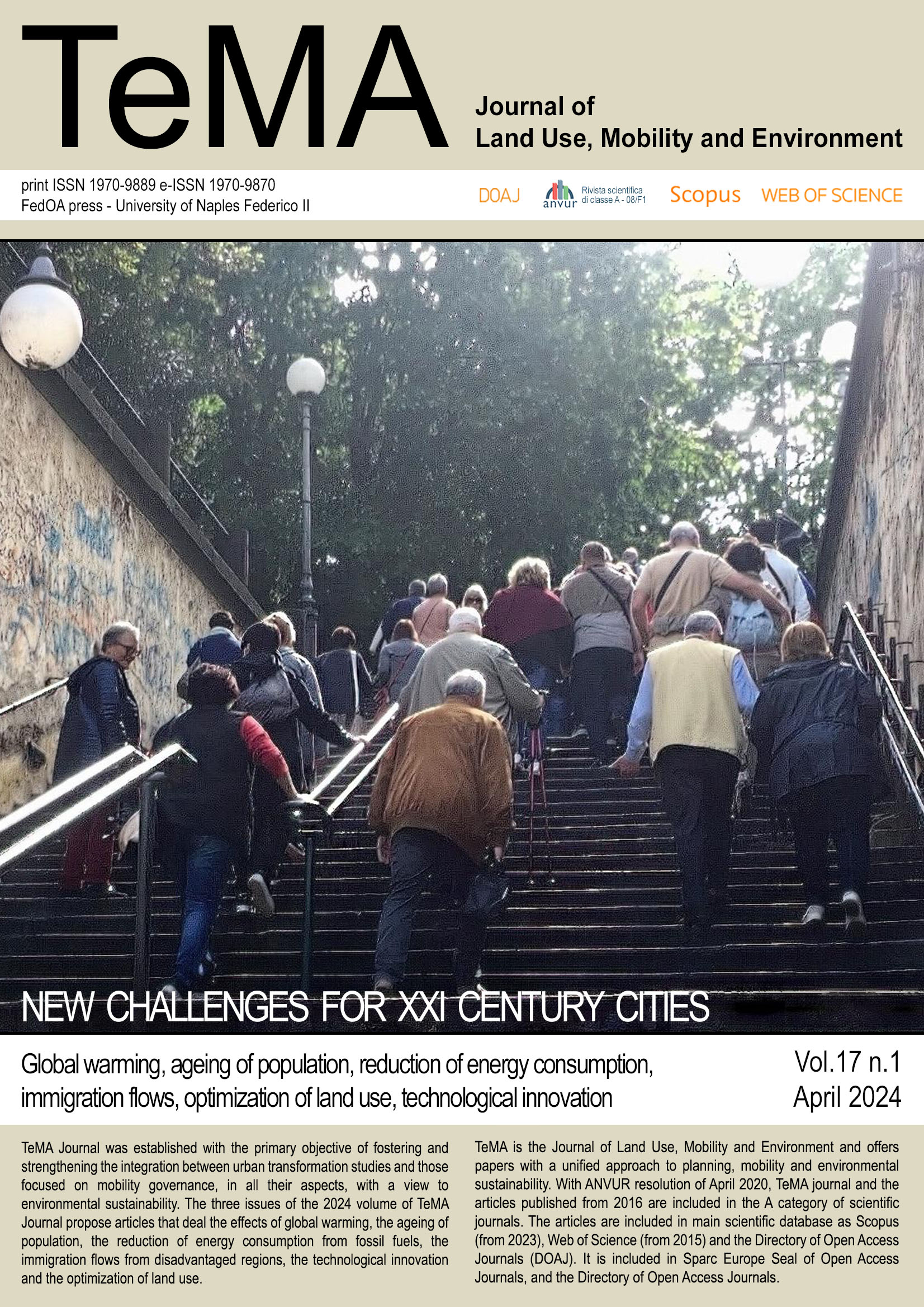New trends in energy transition policies: citizens' involvement in the European energy market
Abstract
Starting from the relationship between urban planning and mobility management, TeMA has gradually expanded the view of the covered topics, always remaining in the groove of rigorous scientific in-depth analysis. This section of the Journal, Review Notes, is the expression of continuously updating emerging topics concerning relationships between urban planning, mobility and environment, through a collection of short scientific papers written by young researchers. The Review Notes are made of five parts. Each section examines a specific aspect of the broader information storage within the main interests of TeMA Journal. In particular, the policies and regulations for the city energy governance section focuses on the challenges that urban energy planning commonly faces, providing food for thought to readers and fellow researchers. This contribution aims at examining these challenges and the solutions proposed in the scientific literature. For the first issue of TeMA Journal volume no. 17, this section is dedicated to the definition of policies and regulations for achieving the energy transition objectives at the European level.
Downloads
References
Apostu, S. A., Panait, M. & Vasile, V. (2022). The energy transition in Europe—A solution for net zero carbon? Environmental Science and Pollution Research, 29 (47), 71358-71379. https://doi.org/10.1007/s11356-022-20730-z
Baigorrotegui, G. & Lowitzsch, J. (2019). Institutional aspects of consumer (co-) ownership in RE energy communities. Energy Transition: Financing Consumer Co-Ownership in Renewables, 663-701. https://doi.org/10.1007/978-3-319-93518-8_28.
Blazquez, J., Fuentes, R. & Manzano, B. (2020). On some economic principles of the energy transition. Energy Policy, 147, 111807. https://doi.org/10.1016/j.enpol.2020.111807
Carpentieri, G., Zucaro, F., & Guida, C. (2022, October). Urban Energy Consumption in the City of Naples (Italy): A Geographically Weighted Regression Approach. In International conference on Climate Change and Environmental Sustainability, 93-104. Cham: Springer International Publishing. https://doi.org/10.1007/978-3-031-46109-5_8
Capasso, S. & Mazzeo, G. (2020). Health emergency and economic and territorial implications. First considerations. TeMA-Journal of Land Use, Mobility and Environment, 45-58. https://doi.org/10.6092/1970-9870/6866.
Cutore, E., Volpe, R., Sgroi, R. & Fichera, A. (2023). Energy management and sustainability assessment of renewable energy communities: The Italian context. Energy Conversion and Management, 278, 116713. https://doi.org/ 10.1016/j.enconman.2023.116713.
Errichiello, L. & Demarco, D. (2020). From social distancing to virtual connections. TeMA-Journal of Land Use, Mobility and Environment, 151-164. https://doi.org/10.6092/1970-9870/6902
European Commission. (2019) Directorate-General for Energy, Clean energy for all Europeans, Publications Office. https://data.europa.eu/doi/10.2833/9937
European Commission. (2021). European Missions: 100 Climate-Neutral and Smart Cities by 2030-Info Kit for Cities
Gaglione, F. & Ayiine-Etigo, D. A. (2021). Resilience as an urban strategy: The role of green interventions in recovery plans. TeMA - Journal of Land Use, Mobility and Environment, 14 (2), 279-284. https://doi.org/10.6093/1970-9870/8054
Gargiulo, C. & Papa, R. (2021). Chaos and chaos: the city as a complex phenomenon. TeMA - Journal of Land Use, Mobility and Environment, 14 (2), 261-270. https://doi.org/10.6093/1970-9870/8273.
Habitat, U. N. (2020). World cities report 2020. The Value of Sustainable Urbanization. Available online: https://unhabitat. org/sites/default/files/2020/10/wcr_2020_report. pdf.
Hoicka, C. E. & MacArthur, J. (2021). The infrastructure for electricity. In The Oxford Handbook of Energy Politics. Oxford University Press.
Horstink, L., Wittmayer, J. M. & Ng, K. (2021). Pluralising the European energy landscape: Collective renewable energy prosumers and the EU's clean energy vision. Energy Policy, 153, 112262. https://doi.org/10.1016/j.enpol.2021.112262
Huhta, K. (2019). Unleashing Consumer Potential in the Energy Transition: A Reflection of the Transforming Role of the EU Consumer. Oil, Gas & Energy Law, 17 (3). www.ogel.org URL: www.ogel.org/article.asp?key=3832
Ji, X., Chen, X., Mirza, N. & Umar, M. (2021). Sustainable energy goals and investment premium: Evidence from renewable and conventional equity mutual funds in the Euro zone. Resources Policy, 74, 102387. https://doi.org/10.1016 /j.resourpol.2021.102387
Lowitzsch, J., Hoicka, C. E. & van Tulder, F. J. (2020). Renewable energy communities under the 2019 European Clean Energy Package–Governance model for the energy clusters of the future?. Renewable and Sustainable Energy Reviews, 122, 109489.
Martinelli, V. (2023). Energy transition: digital (t) win? TeMA - Journal of Land Use, Mobility and Environment, 16 (3), 653-659. http://dx.doi.org/10.6093/1970-9870/10321
Mersinia, I., Penttinen, S. L. & Aalto, P. (2017). Energy transitions: regulatory and policy trends.
Petrović, P., Arsić, M. & Nojković, A. (2021). Increasing public investment can be an effective policy in bad times: Evidence from emerging EU economies. Economic modelling, 94, 580-597. https://doi.org/10.1016/j.econmod.2020.02.004.
United Nations (2018). World Economic and Social Survey 2018: Frontier Technologies for Sustainable Development. New York.
Ulpiani, G., Vetters, N., Shtjefni, D., Kakoulaki, G. & Taylor, N. (2023). Let's hear it from the cities: On the role of renewable energy in reaching climate neutrality in urban Europe. Renewable and Sustainable Energy Reviews, 183, 113444. https://doi.org/10.1016/j.rser.2023.113444
Usman, M. & Balsalobre-Lorente, D. (2022). Environmental concern in the era of industrialization: can financial development, renewable energy and natural resources alleviate some load?. Energy Policy, 162, 112780. https://doi.org/ 10.1016/j.enpol.2022.112780
Yuan, X. C., Lyu, Y. J., Wang, B., Liu, Q. H. & Wu, Q. (2018). China's energy transition strategy at the city level: The role of renewable energy. Journal of Cleaner Production, 205, 980-986. https://doi.org/10.1016/j.jclepro.2018.09.162
Copyright (c) 2024 TeMA - Journal of Land Use, Mobility and Environment

This work is licensed under a Creative Commons Attribution 4.0 International License.
Authors who publish in this journal agree to the following:
1. Authors retain the rights to their work and give in to the journal the right of first publication of the work simultaneously licensed under a Creative Commons License - Attribution that allows others to share the work indicating the authorship and the initial publication in this journal.
2. Authors can adhere to other agreements of non-exclusive license for the distribution of the published version of the work (ex. To deposit it in an institutional repository or to publish it in a monography), provided to indicate that the document was first published in this journal.
3. Authors can distribute their work online (ex. In institutional repositories or in their website) prior to and during the submission process, as it can lead to productive exchanges and it can increase the quotations of the published work (See The Effect of Open Access)

